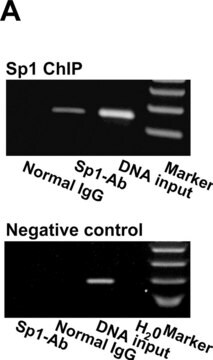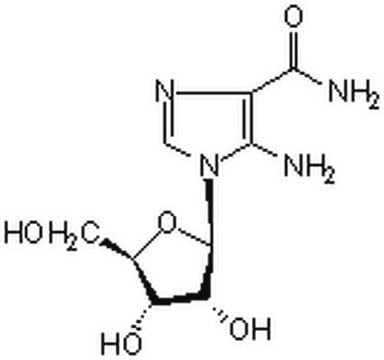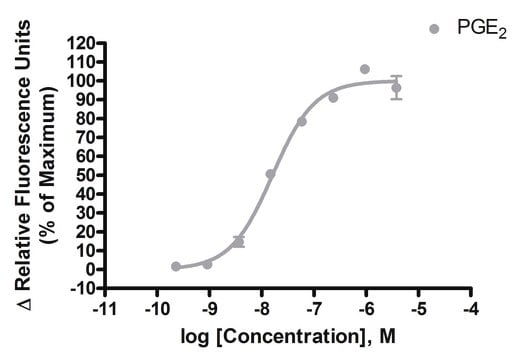HTS004RTA
Ready-to-Assay CXCR4 Chemokine Receptor Frozen Cells
Human
Iniciar sesiónpara Ver la Fijación de precios por contrato y de la organización
About This Item
UNSPSC Code:
41106514
eCl@ss:
32011203
NACRES:
NA.84
Productos recomendados
General description
Millipore′s Ready-to-Assay GPCR frozen cells are designed for simple, rapid calcium assays with no requirement for intensive cell culturing. Millipore has optimized the freezing conditions to provide cells with high viability and functionality post-thaw. The user simply thaws the cells and resuspends them in media, dispenses cell suspension into assay plates and, following over night recovery, assays for calcium response.
The chemokine SDF-1 and its GPCR receptor CXCR4 have a one-to-one specificity that is unique among chemokines and their receptors. SDF-1 binds to CXCR4 expressed on hematopoietic and lymphopoietic cells, and directs their trafficking to and retention in hemato-and lymphatopoietic organs and sites of inflammation (Kucia et al., 2004). CXCR4 is expressed on several tumor cell lineages, and might be responsible for metastasis to sites of SDF-1 expression, such as bone and lymph nodes (Muller et al., 2001). In addition, CXCR4 is a coreceptor for the HIV envelope glycoprotein gp120 (Feng et al., 1996). Small molecule antagonists of CXCR4 have been developed and shown to inhibit infectivity of T-tropic HIV strains and to impair growth of brain tumors (Arakaki et al., 1999; Rubin et al., 2003). Millipore′s cloned human CXCR4-expressing cell line is made in the Chem-1 host, which supports high levels of recombinant CXCR4 expression on the cell surface and contains high levels of the promiscuous G protein Gα15 to couple the receptor to the calcium signaling pathway. Thus, the cell line is an ideal tool for screening for agonists, antagonists and modulators at CXCR4.
The chemokine SDF-1 and its GPCR receptor CXCR4 have a one-to-one specificity that is unique among chemokines and their receptors. SDF-1 binds to CXCR4 expressed on hematopoietic and lymphopoietic cells, and directs their trafficking to and retention in hemato-and lymphatopoietic organs and sites of inflammation (Kucia et al., 2004). CXCR4 is expressed on several tumor cell lineages, and might be responsible for metastasis to sites of SDF-1 expression, such as bone and lymph nodes (Muller et al., 2001). In addition, CXCR4 is a coreceptor for the HIV envelope glycoprotein gp120 (Feng et al., 1996). Small molecule antagonists of CXCR4 have been developed and shown to inhibit infectivity of T-tropic HIV strains and to impair growth of brain tumors (Arakaki et al., 1999; Rubin et al., 2003). Millipore′s cloned human CXCR4-expressing cell line is made in the Chem-1 host, which supports high levels of recombinant CXCR4 expression on the cell surface and contains high levels of the promiscuous G protein Gα15 to couple the receptor to the calcium signaling pathway. Thus, the cell line is an ideal tool for screening for agonists, antagonists and modulators at CXCR4.
Cell Line Description
- GPCR Cell Lines
- Host cells: Chem-1
Application
Ready-to-Assay Human CXCR4 GPCR frozen cells for Calcium Flux FLIPR Assays.
Biochem/physiol Actions
- GPCR Class: A
- Protein Target: CXCR4
- Target Sub-Family: Chemokine
Components
Pack contains 2 vials of mycoplasma-free cells, 1 ml per vial.
Fifty (50) mL of Media Component.
Fifty (50) mL of Media Component.
Disclaimer
This product contains genetically modified organisms (GMO).
Within the EU GMOs are regulated by Directives 2001/18/EC and 2009/41/EC of the European Parliament and of the Council and their national implementation in the member States respectively.
Storage Class
10 - Combustible liquids
wgk_germany
WGK 1
flash_point_f
Not applicable
flash_point_c
Not applicable
Certificados de análisis (COA)
Busque Certificados de análisis (COA) introduciendo el número de lote del producto. Los números de lote se encuentran en la etiqueta del producto después de las palabras «Lot» o «Batch»
¿Ya tiene este producto?
Encuentre la documentación para los productos que ha comprado recientemente en la Biblioteca de documentos.
Nuestro equipo de científicos tiene experiencia en todas las áreas de investigación: Ciencias de la vida, Ciencia de los materiales, Síntesis química, Cromatografía, Analítica y muchas otras.
Póngase en contacto con el Servicio técnico








